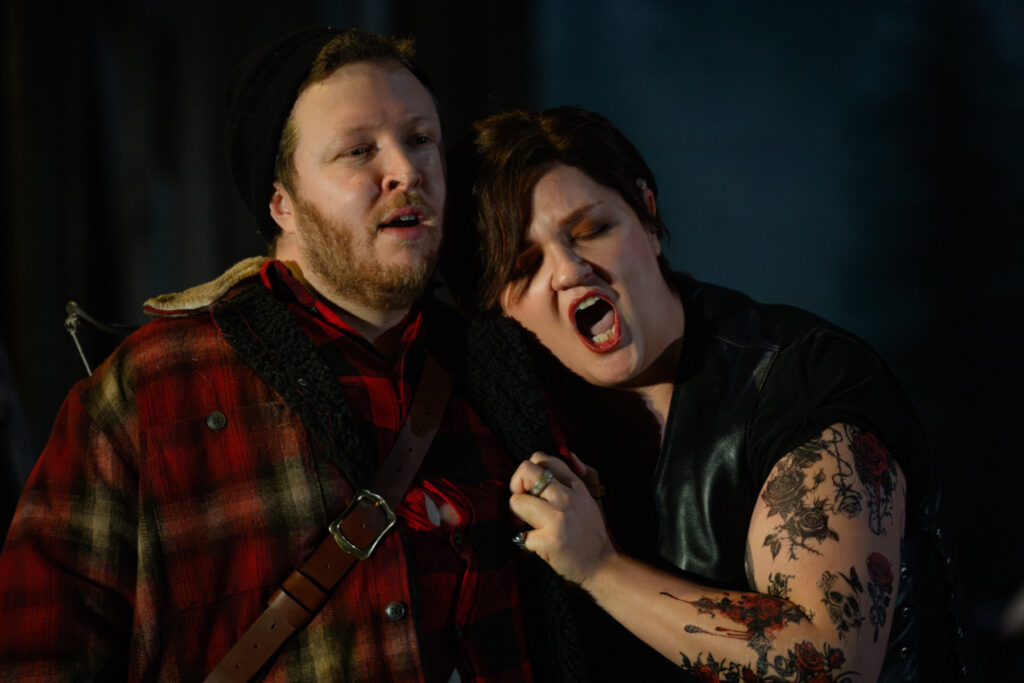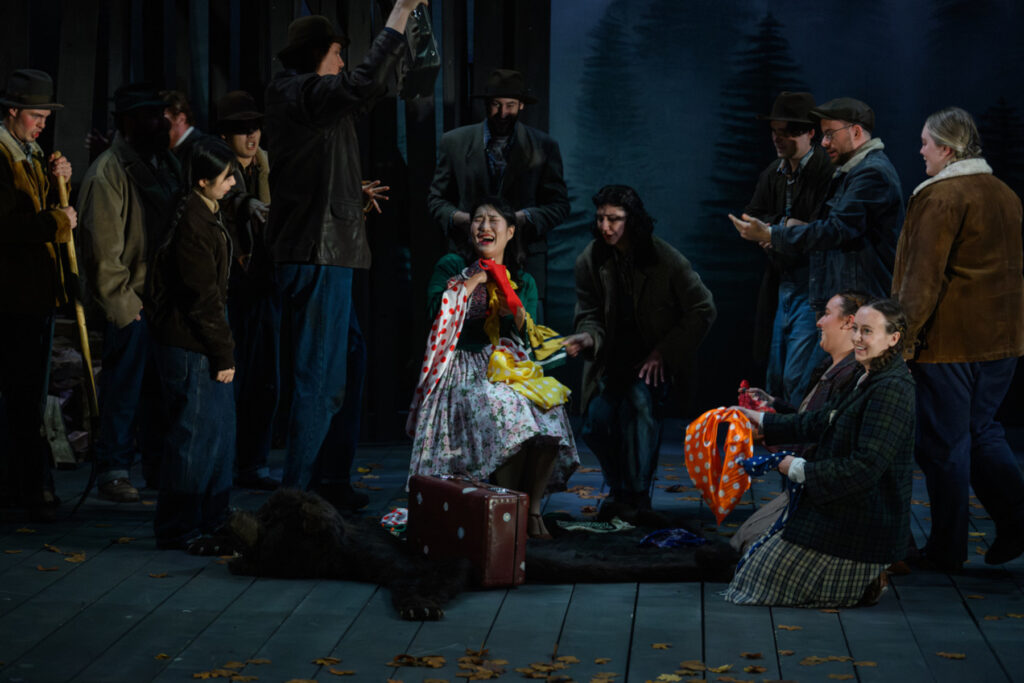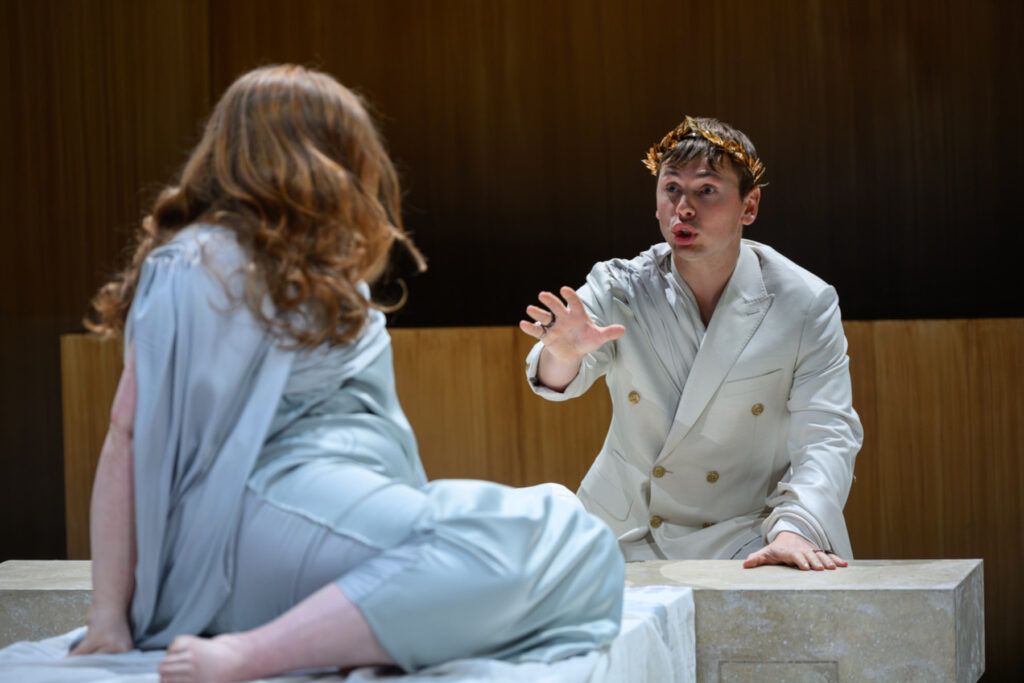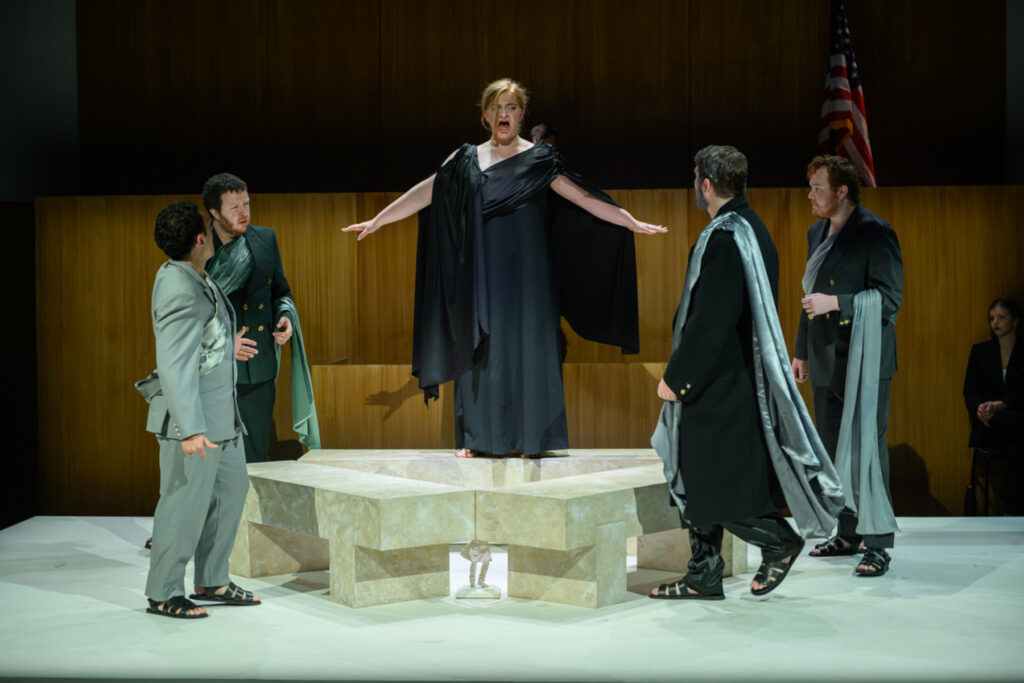Fairy tales have always been a deep source of inspiration for the creative arts. In the German context they tie in with an age-old fascination for and involvement with the forest. Nothing seems to prompt greater sentimentality in the German psyche than the dark and woody expanse in which trees live, grow and harbour untold mystery. The Christmas tree is, after all, a German invention. When Ethel Smyth, child prodigy and later suffragist, began her musical studies at the Leipzig Conservatoire in 1877, she will inevitably have been drawn into such cultural peculiarities and, given the geographical proximity of Bohemia with the specific sound-world of Smetana and Dvořák, been strongly influenced by Central European musical traditions, infused as they were with folklore, popular myths and fairy tales.
At the heart of Smyth’s second opera, Der Wald, is a medieval forest setting, in which the lives of ordinary peasants are dominated by the feudal overlord Rudolf and his scheming sorceress partner Iolanthe. She is part of a love triangle embracing a young couple, the woodsman Heinrich and his betrothed Röschen, in turn reflecting a messy personal relationship which Smyth had with her librettist, Henry Brewster, and his wife Julia. In this production by the Guildhall School of Music & Drama, Jon Morrell’s staging with direction by Stephen Barlow take us much closer to the present-day. This is picked up in the costumes: Röschen wears a patterned knee-length skirt and Heinrich is dressed like a lumberjack. There are further indications of modernity in a stepladder and pots of paint, a vinyl LP which is part of the chest of goodies unpacked by the pedlar, bearing a heroic head on the cover sleeve, lovingly fingered by Röschen, as well as Iolanthe’s “steed”, which turns out to be a powerful motor-bike, while she herself is kitted out in leather gear. Much more menacingly, Iolanthe later has a clutch of mafiosi to enforce her will, dark-clad and sporting sunglasses, complete with torches, a gun and the weapon used to kill Heinrich, a crossbow. At the front of the stage, with a wooden superstructure behind and towering trees in the distance, are small crosses signifying a graveyard. There is a lot of gloom, most obviously reflected in the lighting, all designed to reinforce the mysteries contained in the surrounding forest.

Smyth’s music develops from the riotous jollity of the opening scene, with pre-nuptial merrymaking of the peasants, underpinned by the chorus singing during the prologue of “the renewing magic of spring”, harp and triangle emphasising the celebratory character, into something more sinister. This is first signified by an off-stage horn, Iolanthe’s leitmotif, later enhanced by a growling bass clarinet, a trombone underpinning Röschen’s premonitory reference to the impending disaster, and increasing degrees of edgy expressionism and chromaticism in the orchestral writing. When the chorus sings that “earthly sufferings and earthly desires are fleeting”, repeated at the end of the opera, the audience already senses that Röschen and Heinrich are doomed. There is a strong influence of Wagner, most obviously in the way Smyth uses a big orchestra to accompany what are essentially intimate scenes.
Seohyun Go sang a fresh-toned and appealing Röschen, sensitive to the demands of demureness and modesty implicit in the “rosebud” associations of her name. I was less impressed with her tendency to use a wide vibrato, which led to a certain shrillness at times, and she didn’t always have the amplitude to counter the full sounds of the orchestra. She was touchingly resolute at the very end, rather like Cio-Cio San, as she prepared the noose for her own suicide.
Harry Jacques as Heinrich seemed at times to be happier in the baritonal reaches of his tenor role, where warmth was more readily on display. He interacted well with Röschen, not least in the poetic and central love duet, and was suitably defiant in rejecting Iolanthe’s attempts to seduce him.

Avery Lafrentz sang an imposing Iolanthe: this is more of a mezzo role but with numerous top Bs, and she negotiated the wide tessitura well. She was forceful where necessary but exuded sensuality where appropriate, declaring at one point in the direction of Heinrich that she wanted to be conquered, and yet was not averse to flirtations with her henchmen either. There was a commanding chill in her voice as she descended into alto-like depths for her ultimatum to Henrich to follow her or die. I liked the focused warmth of Redmond Sanders’s baritone in the comparatively small role of Rudolf, perplexed at the coldness and disdain shown towards him by his partner. Throughout Dominic Wheeler shaped the complexities of the score well, ensuring a solid bass line at the start and picking out lots of significant detail, like the ascending flute line in the love duet, though very occasionally the big Wagnerian sounds threatened to overwhelm the singers.
Ethel Smyth’s music has recently been rediscovered. She was honoured in her own time, being awarded a damehood in 1922. Throughout the 20th century, Der Wald remained the only opera by a female composer to be staged at the Met. All credit to the Guildhall team for reminding audiences of Smyth’s skill and inventiveness.

More commonly known for his three commanding Roman tone poems, Respighi was, like virtually all Italian composers, a man of the theatre. He composed several ballet scores and nine operas, the last of which, Lucrezia, had to be completed by his wife Elsa after his early death from bacterial endocarditis in April 1936. This formed the second half of the Guildhall’s double bill.
Constancy is a recurring idea in literature and music as well as a guiding element in personal relationships. Elsa Respighi lived for another sixty years after the death of her husband and devoted all her efforts towards championing and celebrating his musical legacy. Just a few months after being widowed, she wrote to the librettist of Lucrezia: “I live because I can truly still do something for him. And I shall do it, that is certain, until the day I die.” She was indeed faithful to her word.
Constancy too defines Lucrezia: she is unwaveringly loyal to her husband Collatino and to her own personal sense of dignity and integrity. In all the iterations of the story she is at the heart of the unspeakable outrage and violence perpetrated upon her. This also comes through very strongly in Respighi’s score where Lucrezia sings half of the total music, with increasingly major technical demands on the voice.
This Guildhall staging was not uniformly successful. There was an unmistakable link to Mussolini’s fascist Italy in the way the stage was dominated by the symbol of the bundle of sticks and an axe set in wooden panelling, indicating the power over life and death, itself an Imperial Roman insignia. Below this sat a largely static, non-singing individual, appearing to preside over the unfolding proceedings in the courtroom below, staring ahead impassively, with the final actions of his mallet bringing matters to a close at the end of the opera. But what was a not entirely accurate US flag doing to the judge’s left? That made little sense. The costumes too were spatchcocked together: the men wear pastel-coloured suits but Roman-style sandals. For their libation, they drink from a chrome thermos flask. The rapist and Prince of Rome, Tarquinio, bears a coronet. After her suicide, Lucrezia unfurls a red scarf, picked up in the red T-shirts her avengers display after their disrobing, and I thought her transition from a cream outfit to the colour of mourning after the rape totally arresting. All the Roman ladies wear period costumes. Respighi employs a character called La Voce, designed to be sung in the manner of a Greek chorus from the orchestral pit, but here seen regularly traversing the stage in a black suit, driving forward the narration in a recitative while also commenting on the action. This was sung persuasively with varied vocal colouring by Gabriella Giulietta Noble.

Hannah McKay’s assumption of the title role was utterly compelling. She skilfully conveyed a wide range of complex emotions, from the tenderness towards her handmaidens, through her generosity of spirit initially displayed towards Tarquinio when he enters her household as a guest, to her increasing unease and shock as she realises his true intentions, spitting out her words in disgust at one point, to the sense of desolation and abandonment after the deed itself – tastefully kept from view by the descent of a central curtain – and the grief and shame she conveyed through the richness of her chest tones. Redmond Sanders was a dark-grained and insidious villain, giving the role of Tarquinio more than simple brutal masculinity, the baritone voice echoing Scarpia’s entreaties and importuning, overt in his declaration that Lucrezia could be Queen of Rome if she but gives in to him.
Respighi’s powers as an orchestrator are nowhere more evident than in the way he signals the approach to the rape scene and in its aftermath. The upper strings are soft and silky as La Voce refers to the heroine dreaming of her husband’s love. Just before Tarquinio enters her bedroom, there is an ominous bass clarinet and pounding sounds from the timpani, minatory horns assert Tarquinio’s mounting desire, and the rape scene itself is coloured by the dissonant lower brass and chilling trumpets. There are Puccini-like sonorities, full woodwind in minor mode and darkly expressive lower strings, to express the immediate pain at what has happened. Staccato string chords preface the announcement of Tarquinio’s name as the perpetrator of the vile deed, just as earlier pizzicatos from the double basses presage his arrival on the scene. Wheeler drew out all the vibrancy in the score, especially the baleful and cutting sounds from the brass.
Tobias Campos Santiñaque as Collatino had little to sing in the early part of the opera, where the military men discuss the moral character of their wives, but he came into his own after his return to the scene of the crime. His light, lyrical tenor was full of ardour in expressing undying love for his wife and recalling the blissfulness of their early love, collapsing at her feet in the depths of his own despair. “An evil hand ripped and broke me…I lie in the mud…The fount of all innocent joy is poisoned”: these are the words Lucrezia sings, sustained with incredible vocal stamina and emotional power, before she knifes herself.
This cataclysmic deed also had political consequences. Tarquinio’s vile act brought about the end of the monarchy in Rome. As the unison cries of “a Roma” sound at the end of Respighi’s opera it is a salutary reminder that all actions have consequences, many of which are unforeseen and often unintended.
Alexander Hall
Der Wald
Music drama with prologue and epilogue in one act composed by Ethel Smyth, to a German libretto by Henry Brewster and the composer. Sung in German with English surtitles
Lucrezia
Opera in one act and three tableaux composed by Ottorino Respighi, to a libretto by Claudio Guastalla, after Livy, Shakespeare and Ovid. Sung in Italian with English surtitles.
Cast and production staff:
Der Wald
Röschen – Seohyun Go; Iolanthe – Avery Lafrentz; Heinrich – Harry Jacques; Rudolf – Redmond Sanders; Peter – Oliver Williams; Pedlar – Sonny Fielding; A Young Boy – Samuel Horton; First Huntsman – Ben Hendry-Watkins
Lucrezia
La Voce – Gabriella Giulietta Noble; Lucrezia – Hannah McKay; Servia – Marianne Ruel; Venilia – Manon Ogwen Parry; Collatino – Tobias Campos Santiñaque; Bruto – Harry Jacques; Tarquinio – Redmond Sanders; Tito – Sonny Fielding; Arunte & Spurio Lucrezio – Oliver Williams; Valerio – Sonny Fielding; Defendant – Jacob Cole; Plaintiff – Hannah Hughes; Judge – Ben Hendry-Watkins
Director – Stephen Barlow; Designer – Jon Morrell; Lighting Designer – Simon Bennison; Intimacy Director – Abigail Kessel; Fight Director – Bret Young; Choreographer Charlie Morgan; Assistant Conductor & Chorus Master – Jack Stone; Assistant Director – Oscar Simms; Assistant Lighting Designer – Lili Warden; Chorus & Orchestra of Guildhall School of Music & Drama; Conductor – Dominic Wheeler
Top image: Hannah McKay as Lucrezia, Marianne Ruel as Servia, Manon Ogwen Parry as Venilia in Lucrezia
All photos © David Monteith-Hodge